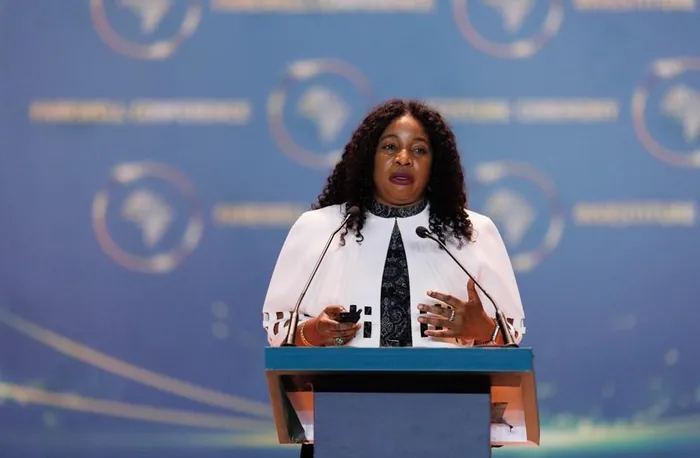Afreximbank nears deal to make SA a sovereign shareholder, paving way for greater investment

Gwen Mwaba, managing director for trade finance and correspondent banking at Afreximbank, said on Friday the process is “very close” to completion, following a press statement released a few months ago indicating progress toward South Africa’s ratification of the corporation’s founding agreement.
Image: Supplied
The African Export-Import Bank (Afreximbank) has said that it is finalising the ratification process that will officially make South Africa a sovereign shareholder in the multilateral development finance institution — a move expected to unlock a significant increase in infrastructure investment and financial support for the country.
This follows the Cabinet’s approval in August for South Africa to acquire Class A shares in the Cairo-headquartered multilateral lender, which currently holds assets worth about $43 billion. Once completed, the ratification will grant South Africa a seat on Afreximbank’s board, giving it direct influence over the bank’s strategic direction and resource allocation.
The absence of sovereign membership has until now limited Afreximbank’s ability to provide large-scale support for South African projects. The move also aligns with Pretoria’s ambition to deepen its participation in the African Continental Free Trade Area (AfCFTA) and strengthen regional trade integration.
Gwen Mwaba, managing director for trade finance and correspondent banking at Afreximbank, said on Friday the process is “very close” to completion, following a press statement released a few months ago indicating progress toward South Africa’s ratification of the corporation’s founding agreement.
“South Africa is a Member State of the continent, but we only start engaging deeply with countries once they become shareholders. We already have two South African State-owned entities that are shareholders of Afreximbank, and because of that we were able to do the Eskom transaction,” Mwaba said.
“So we are expecting to see a big trajectory, an increase of the Afreximbank intervention in the South African market, both directly and to financial institutions. We already support the financial institutions, a number of them are in our program. But we also need to start doing a lot more direct financing, both for State and privately-owned corporations. And I think as soon as the ratification is done, we'll see that market open up.
“It's one of the top three economies on the African continent, so there's no reason why we shouldn't get to the same levels of support as what we're doing to Nigeria and Egypt once all of those formalities are concluded.”
Afreximbank has been a central player in advancing the AfCFTA, having developed the Pan-African Payment and Settlement System to facilitate cross-border transactions.
Mwaba described the Bank’s role as “key and instrumental” in bringing the trade agreement to life.
“We have the benefit of having 54 African member states who are shareholders of the Bank. That gives us convening power and influence to engage governments on the importance of the AfCFTA — especially at a time when there was reluctance and uncertainty about what it would mean for tariff revenues,” she said.
The AfCFTA, which aims to create a single African market by reducing and eventually eliminating tariffs on intra-African trade, initially faced hesitation from several Member States concerned about revenue losses.
To address these concerns, Afreximbank introduced an Adjustment Facility to cushion countries against short-term tariff losses and ensure smooth implementation of the agreement.
“All credit goes to [Afreximbank President] Professor Benedict Oramah for ensuring the AfCFTA materialized and became a reality,” Mwaba said.
Beyond advocacy, Afreximbank has also provided financial sponsorship and technical support to the AfCFTA Secretariat to help overcome funding constraints and accelerate implementation.
“By sponsoring the AfCFTA’s tariff processes and implementation work, we helped fast-track the institution’s progress,” she explained.
At the heart of Afreximbank’s strategy is the promotion of intra-African trade, described as the “arrowhead” of the Bank’s development agenda.
While extra-African trade — involving the rest of the world — remains essential, the Bank has placed special focus on boosting trade within Africa by establishing a dedicated business pillar called the Intra-African Trade Initiative.
However, the Bank acknowledges that intra-African trade cannot flourish without the necessary infrastructure.
“We cannot have efficient trade if we don’t have proper roads, railways, or streamlined border crossings. So Afreximbank also finances trade-enabling infrastructure and advocates for smarter border management,” Mwaba said.
To address the costly delays caused by multiple checkpoints and inefficient customs systems, the Bank launched the Intra-African Transit Guarantee Scheme. The initiative ensures that goods moving across multiple countries can do so without unnecessary delays or suspicion.
“For example, if a truck leaves Cairo with goods destined for Cape Town, our guarantee allows it to pass seamlessly through all countries en route. This reduces transit times, lowers costs, and makes trade more predictable,” Mwaba said.
Through such interventions — combining finance, advocacy, and infrastructure development — Afreximbank continues to play a central role in turning the promise of the AfCFTA into a practical reality, strengthening Africa’s economic integration and positioning the continent for sustained growth.
BUSINESS REPORT